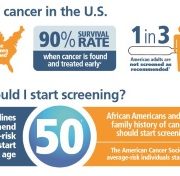Why You Shouldn’t Wait To Get A Colorectal Cancer Screening
Are you on the fence about getting screened for colorectal cancer? Perhaps you think you’re too young to get cancer, or you don’t have a family history of it, or you’re anxious about the procedure. You push off the appointment, allowing yourself to think, “I’ll do it sometime soon…”
When it comes to colorectal cancer screenings, you shouldn’t ever wait. Regular screenings are recommended for those 45 years and older, and even younger if you have certain risk factors. For example, people with certain inherited conditions are at a higher risk for colon cancer, including those with Lynch syndrome and those with adenomatous polyopsis. You are also at higher risk if you suffer from certain inflammatory bowel diseases like Crohn’s colitis, or ulcerative colitis.
Early detection is the key to effectively dealing with colorectal cancer. When detected early, colorectal cancer has a 95% survival rate. However, that rate drops to 25% if the cancer is not detected and spreads to other organs.
Screening tests aren’t just used to identify existing cancer. Through screening, your doctor may find and eliminate precancerous polyps (abnormal tissue growths) in the rectum or colon, removing them before they even have the chance of becoming cancerous. Between 25-40% of adults in the United States are estimated to have colorectal polyps.
Colorectal Cancer Increases in Younger Populations
While the overall occurrence of colorectal cancer has dropped in recent years (largely due to a rise in screenings), its rate among younger populations has actually increased. In fact, according to the American College of Gastroenterology, a millennial now has 2 times the risk of getting colon cancer and 4 times the risk of getting rectal cancer than someone from the baby boom generation. Research shows that rates in adults younger than 50 are continually increasing by 2%, every year. Mortality rates are also increasing.
What is causing this alarming change? Researchers attribute higher colorectal cancer rates in younger adults to a number of factors, including higher rates of obesity, more sedentary lifestyles, poor diet, and other environmental factors. A study released this May found a link between the consumption of sugar-sweetened drinks and colorectal cancer in women under 50. According to the study, women who drank two or more servings of sugary beverages had twice the risk of developing early-onset colorectal than those who consumed less. Furthermore, adolescents ages 13-18 who consumed sugary sodas had a 32% risk of eventually developing early-onset colorectal cancer. Research is only beginning to unlock certain lifestyle and dietary factors that play a role in developing colorectal cancer.
Colorectal Cancer and Covid-19
During the beginning of the Covid-19 pandemic, lockdowns and closings forced many people to cancel or put off every type of screening test. Colorectal screening tests in particular decreased by over 90%. In the following months, the numbers of tests only increased to 50% of what they were before the pandemic began. This drastic decline in testing is associated with troubling data about cancer outcomes. In June 2020, the National Cancer Institute predicted an excess of 10,000 colorectal cancer or breast cancer related deaths in the U.S. over the next 10 years, just because of pandemic-induced delays in testing, diagnoses, and treatments. Remaining up-to-date on testing is more important now than ever.
If you’re due for a colorectal screening test or appointment, but are concerned about Covid-19 safety, don’t hesitate to book an appointment at Gastroenterology Health Partners. We uphold a number of safety procedures in-office, including mask requirements, cleaning and sanitization practices, disinfecting common spaces, and upholding social distancing when possible. Maintaining your safety is of the highest importance to us, just as is providing you with colorectal screening tests such as colonoscopies, flexible sigmoidoscopies, and more. Give us a call today to schedule your appointment.













